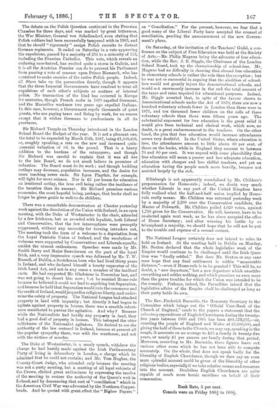On Saturday, at the invitation of the Teachers' Guild, a
con- ference on the subject of Free Education was held at the Society of Arts,—Mr. Philip Magnus being the advocate of free educa- tion, while the Rev. J. R. Diggle, the Chairman of the London School Board, took up the championship of school-fees. Mr. Magnus had no difficulty in showing that abroad free education in elementary schools is rather the rule than the exception ; but he was not so successful in arguing that the abolition of school- fees would not greatly injure the denominational schools, and would not enormously increase in the end the total amount of the taxes and rates required for educational purposes. Indeed, Mr. Diggle asserted that, in spite of the favour shown to denominational schools under the Act of 1870, there are now a hundred voluntary schools fewer in London than there were in 1871, and ten thousand fewer children on the rolls of these voluntary schools than there were fifteen years ago. The substantial argument for free education is the great relief it would give from technical and clerical work, which now, no doubt, is a great embarrassment to the teachers. On the other hand, the plea that free education would increase attendances seems very doubtful. In the United States, where education is free, the attendances amount to little above 60 per cent. of those on the books, while in England they amount to between 70 and 80 per cent. It was argued with some plausibility that free education will mean a poorer and less adequate education, education with cheaper and less skilful teachers, and yet an education taxing the people much more heavily, because not assisted largely by the rich.














































 Previous page
Previous page